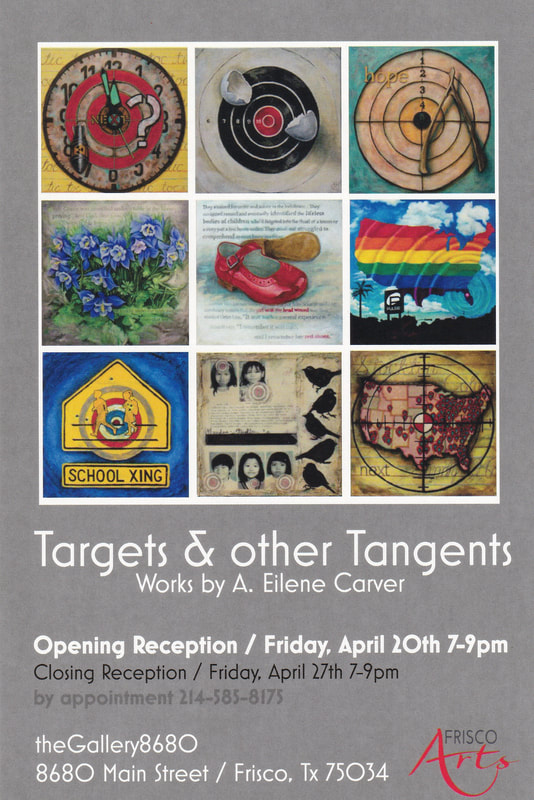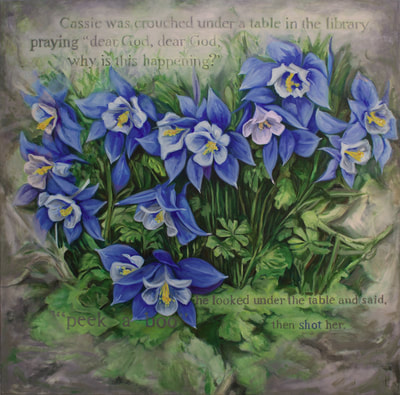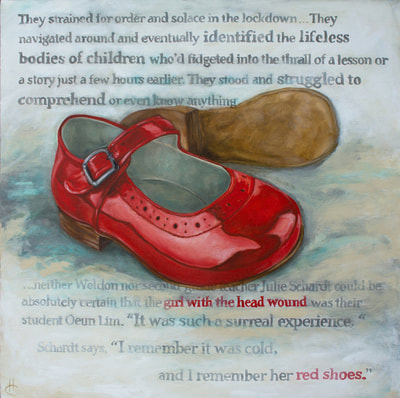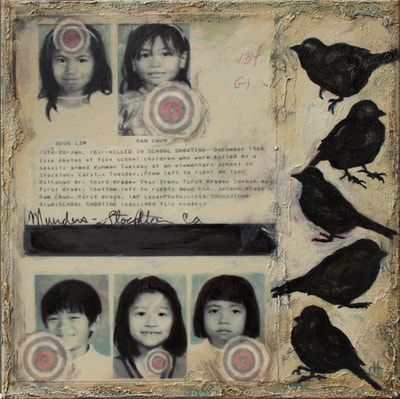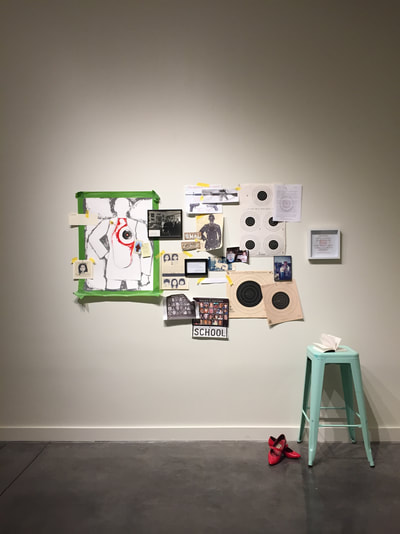Targets Series A. Eilene Carver
Targets addresses the personal and public impact of gun violence.
The Stockton school shooting in 1989 haunted me for decades. Sandy Hook compelled me to symbolically depict the intimate personal loss of these ‘small targets’.
As I researched, google documents of shooting incidents show drop pins too numerous to count across maps of the United States. Overlapping pins, block memories of a prior events- a parallel to our overloaded consciousness – we collectively forget the impact of each personal loss. Targeted violence has become an undesirable societal constant.
The Target seemed an obvious symbol to represent the random acts of violence, suggesting a predator setting aim on a focused subject. Beginning my research three years ago, the intended topic was school shootings, but quickly evolved to include relevant examples of social violence such as: Black Lives Matter, the Pulse nightclub massacre, Dallas Police shootings, and violence rooted in religious persecution.
Layering content interests me as much as the physical process of painting. The expression of light and color on forms remains a constant, across all my work. I purpose physically textural surfaces to create a tumultuous subtext. I want these images to initially be aesthetically pleasing and then surreptitiously confront the viewer with their sober message.
In some of the school specific works more somber palettes naturally emerged in the creative process, due to my emotional involvement with the subject.
I strive for my work to be visually interesting while inspiring individual introspection. I remain as shocked at the thought of children as targets as I was by that first incident so long ago. My ultimate desire is that these paintings would stir emotions, spur dialogue and provoke impactful change of this complicated dilemma. If ignored, we are all possible ‘Targets.’
All Artwork By
A. Eilene Carver, Artist
www.houstoncarverstudio.com
“to live means to be aware, joyously, drunkenly, serenely, divinely aware.” -Henry Miller
Targets Series A. Eilene Carver
Targets addresses the personal and public impact of gun violence.
The Stockton school shooting in 1989 haunted me for decades. Sandy Hook compelled me to symbolically depict the intimate personal loss of these ‘small targets’.
As I researched, google documents of shooting incidents show drop pins too numerous to count across maps of the United States. Overlapping pins, block memories of a prior events- a parallel to our overloaded consciousness – we collectively forget the impact of each personal loss. Targeted violence has become an undesirable societal constant.
The Target seemed an obvious symbol to represent the random acts of violence, suggesting a predator setting aim on a focused subject. Beginning my research three years ago, the intended topic was school shootings, but quickly evolved to include relevant examples of social violence such as: Black Lives Matter, the Pulse nightclub massacre, Dallas Police shootings, and violence rooted in religious persecution.
Layering content interests me as much as the physical process of painting. The expression of light and color on forms remains a constant, across all my work. I purpose physically textural surfaces to create a tumultuous subtext. I want these images to initially be aesthetically pleasing and then surreptitiously confront the viewer with their sober message.
In some of the school specific works more somber palettes naturally emerged in the creative process, due to my emotional involvement with the subject.
I strive for my work to be visually interesting while inspiring individual introspection. I remain as shocked at the thought of children as targets as I was by that first incident so long ago. My ultimate desire is that these paintings would stir emotions, spur dialogue and provoke impactful change of this complicated dilemma. If ignored, we are all possible ‘Targets.’
All Artwork By
A. Eilene Carver, Artist
www.houstoncarverstudio.com
“to live means to be aware, joyously, drunkenly, serenely, divinely aware.” -Henry Miller

